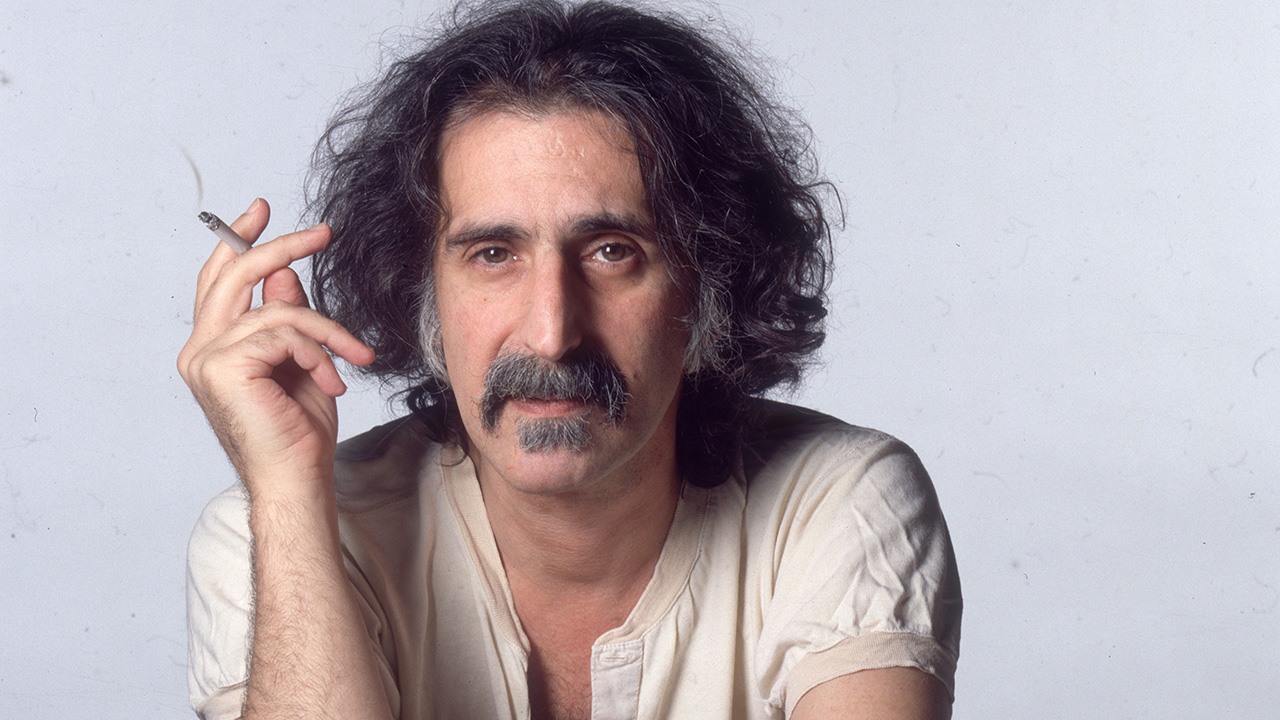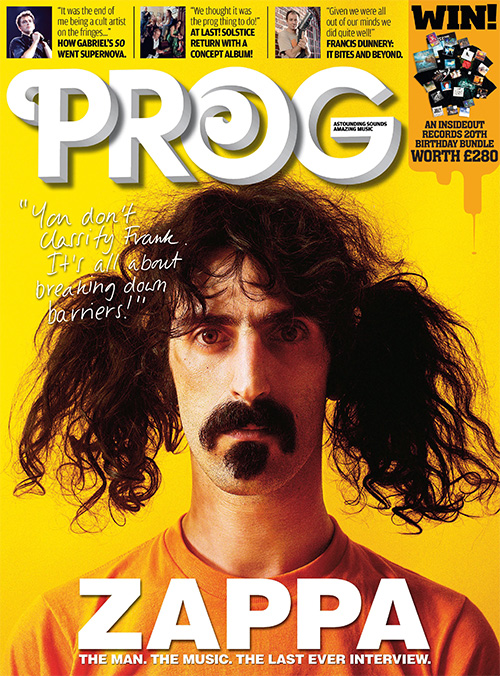
Despite his wild reputation, freak persona and ‘filthy’ lyrics, Frank Zappa was one of rock’s most serious and progressive composers. In 2013 Jon Anderson, Adrian Belew, Mike Keneally and former Mother Don Preston told Prog about the musical method behind Zappa’s perceived madness.
On the Mothers of Invention’s 1969 Uncle Meat, you can hear Frank Zappa exhort keyboardist Don Preston to climb up to the Royal Albert Hall’s majestic pipe organ and belt out the riff to Louie Louie. Preston is now is part of all-star tribute band the Grandmothers Of Invention. “Musicians, guitarists mostly, often come up to me and ask, how do I play like Zappa? I say, it’s simple – just listen to all the music Zappa listened to!”
Like most teenagers growing up in California in the 50s, Zappa loved doo-wop, R&B, blues and early rock’n’roll. But his adolescent musical imagination was truly set alight by Ionisations, a piece of percussive avant-garde music by French-born composer Edgard Varèse. This gave him a taste for 20th-century modernist composers, from Charles Ives to Igor Stravinsky.
“He’d listen to that stuff like other kids were listening to the latest rhythm and blues song,” remembers Preston. “That music, the complexity of it, matched the complexity of his own mind. In the opening phrase of Stravinsky’s Petrushka, the flute is in 5/8 and the orchestra is in 2/4. On The Little House I Used To Live In from Burnt Weeny Sandwich [1970], the bass and drums are playing in 11/8 and the melody is in 12/8.
“One of the things that made him a genius was that he could play experimental music and get it over to the audience, by throwing in doo-wop or pop music. He’d use real popular music to play real unpopular music.”
If there’s one thing that unifies the extraordinarily pluralist catalogue he created over his lifetime, it’s the combination of ‘popular’ and ‘unpopular.’ From his 1966 debut Freak Out! to landmark titles like Hot Rats, Apostrophe and bestseller Sheik Yerbouti, he would create a progressive musical universe where every style – from rock to reggae, surf-rock to Schoenbergian, free jazz to musique concrète – was up for grabs.
“When you’re adopting or adapting a style in order to tell a story,” he once said, “everything’s fair game. You have to have the right setting to the lyric. The important thing at that point is to tell the story.”
His lyrics also reflected his complexity. Drawing on sex, deviance, politics and social concerns, he would satirise, parody and mock, well, pretty much everyone. Zappa’s absurdist universe was populated by fake hippies, charlatan gurus, corrupt politicians, dental floss farmers, dumb groupies and even dumber rock stars. If his overarching quest was a search for truth, he did it by exposing its opposite.
It was surprising to see an artist who was of the scene but also apart from it, and commenting on it so acidly
Mike Keneally
Jon Anderson contends that progressive music began with Zappa. “It was a combination of things,” he says. “If you listen to Zappa, The Beatles, Vanilla Fudge, Buffalo Springfield, and Charles Mingus and Roland Kirk, there was such a plethora of interesting music around the mid-60s, and that all inspired me when Yes started to do long-form music. His music was really meticulously put together, and he was a comedian at the same time.”
Freak Out!’s blend of chart-friendly tunes (You Didn’t Try To Call Me), outré psych-rock (Who Are The Brain Police?), experimental jazz (The Return Of The Son Of Monster Magnet) and social comment (Trouble Every Day) pointed the way. Keyboardist/guitarist Mike Keneally played in Zappa’s band for his last-ever tour in 1988, but was in single figures when he first heard Freak Out!
“Half of it is easy to get hold of, the other is absurdism. Frank was combining things in different ways; he was reading the zeitgeist nicely and expressing attitudes that a lot of people felt. It was surprising to see an artist who was of the scene but also apart from it, and commenting on it so acidly.”
The Mothers borrowed from the Sgt Pepper cover – with fans Lennon and McCartney’s blessing – for 1968’s We’re Only In It For The Money, ridiculing the prevailing hippie scene on the hilarious Who Needs The Peace Corps? “That album is Frank’s greatest and most sustained piece of social commentary,” says Keneally, “and a startling musical and technical achievement. But he was using naughty words too, and there were sped-up voices!”
With its advanced multi-tracking and production techniques, 1969’s Hot Rats would become considered a jazz-fusion landmark, and contained one of the composer’s best-known works. “Listen to Peaches En Regalia,” says Anderson, “It’s magnificent work. He was brilliant – there’s no question.”
Zappa disbanded the first Mothers line-up that year, and over the next decade his sound benefited from evolving production smarts and his growing reputation as a grandstanding, idiosyncratic guitar hero. 1973’s Over-Nite Sensation features some of his best-known songs – Camarillo Brillo, I’m The Slime and absurdist masterpiece Montana – and the following year’s Apostrophe’ proffered Don’t Eat The Yellow Snow and Cosmik Debris.

They’d featured progressive orchestrations and virtuoso playing from drummer Aynsley Dunbar, keyboardist George Duke and violinist Jean-Luc Ponty; but they also showed their composer’s increasing, censor-baiting fondness for bawdy, scatological lyrics.
“Oh, he’d go for the jugular,” says Anderson. “He wouldn’t mess around. A lot of time as a writer it’s difficult to say exactly what you’re thinking. I would use metaphors all the time, but Zappa didn’t give a damn. He just said what he thought.”
Zappa recruited newcomer guitarist Adrian Belew for the concerts that produced 1979’s Sheik Yerbouti. Belew recalls the band had a show in Cincinnati, where his mother, a Sunday school teacher, was living. “She was so pleased for me – but I told her I didn’t want her to come to the show, because of the things I’d be singing. She said something that shook me to the ground. She said, ‘Is it true he’s got a song called I Promise Not To Come In Your Mouth?’ ‘Yes, Mom, that’s true.’ She didn’t go to the show!”
While accessible, Broken Hearts Are For Assholes, Bobby Brown (Goes Down) and disco-pastiche Dancin’ Fool feature knotty musical ideas, but the seemingly cold misanthropy of the lyrics might deter the fainthearted. I asked him about it once,” says Belew. “He said he just reflects the craziness around him. He’d see other people go nuts and then write about that. There’s a part of the audience for whom that’s the appeal: that he’s really putting it out there with radical tunes like that.”
Zappa encouraged Belew to play in unusual time signatures. “Without that I don’t know how I’d have made it into King Crimson,” he says. “A lot of our stuff is based on polyrhythms and odd time signatures, me singing in one and playing in another. He taught me how to be a professional musician, and drew out of me that I could play more complicated material. He challenged me.”
As for Zappa’s proggiest moments, Keneally goes back to 1973’s One Size Fits All. “Inca Roads is the quintessential Zappa tune. The subject matter [aliens landing in Inca times] is cosmic, but it’s not social commentary, it’s not cynical or sexual, and the music’s a multi-part suite that goes through endless time and key changes. The sound of George Duke’s keyboards is very prog and the playing on there is virtuosic and exciting. It all sparkles.
He will eventually be remembered as one of the great composers of our time
Adrian Belew
“Then for people into Henry Cow or Canterbury, Uncle Meat is ground zero. I think it was a huge influence on Fred Frith and Chris Cutler. Burnt Weeny Sandwich too – for Frank that’s almost pastoral. I can see Genesis fans getting into that. Some of Ian Underwood’s piano work is just as beautiful as the intro to Firth Of Fifth.”
In a 1992 interview, The Simpsons creator and lifelong fan Matt Groening asked Zappa if he thought music should make progress, if a composer should do things that hadn’t been done before. Zappa argued that, rather than be progressive, it was more important that a creator’s art should be personalised. Music, he said, “should be relevant to the person who writes the music. It has more to do with the composer than with the style of the times or the school that might have generated the composer.”
By that time, Zappa, in failing health, had come full circle, throwing himself into contemporary orchestral music with Civilization Phaze III. An ambitious work composed on the then-cutting-edge digital sampling system, the Synclavier, it was complex, socially charged and, yes, fearlessly personalised. It would be the last artefact from a seemingly inexhaustible imagination that offered up in excess of 60 albums over nearly three decades.
“He will eventually be remembered as one of the great composers of our time,” Belew contends. “Civilization and The Yellow Shark [his suite performed by the Ensemble Modern in ’92] are beyond anything anyone else has done. His use of Synclavier to create a new universe of sounds was incredible. He had so many sides to him, and the orchestral stuff is my favourite part of Frank’s work.”
“He’s very well respected,” says Anderson. “I recently did some shows with [youth orchestra project] School Of Rock, and they’d just come back from doing a Zappa festival in Germany. These 30 kids could play Zappa music at the drop of a hat. Young people dig what he did.”
As for Preston, 35 years after his Albert Hall moment, he’s touring with the Grandmothers, grappling with the Zappa catalogue. “Every night we ask the audience to applaud Frank’s brilliance. I’m just grateful to be out there playing this brilliant, challenging music.”







